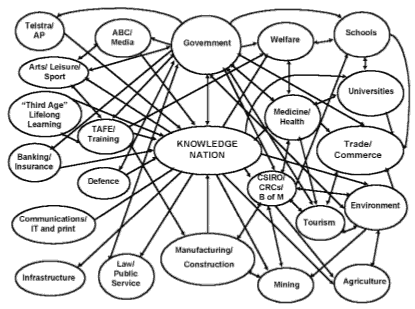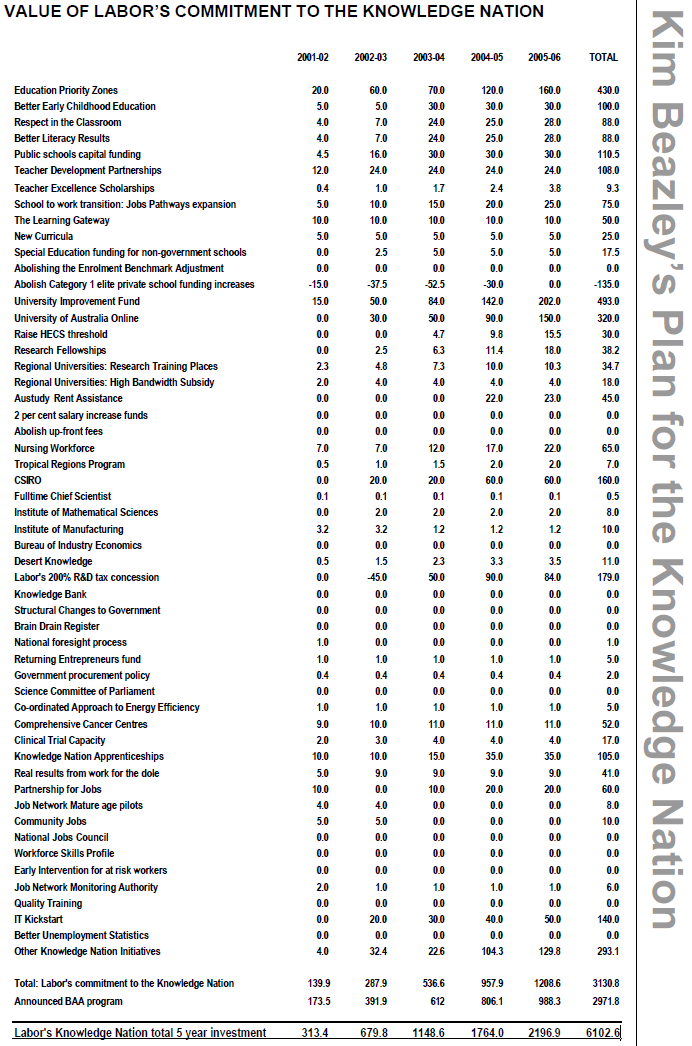|
Editorial-28 January 2007 |
|
|
|
|
Learning Promoted to the Status of Political Football?
|
 |
|
|
|
Remember the "Knowledge Nation" and the Barry Jones' graphic depiction ridiculed by the Liberal-National Coalition as well as most of the media as a spaghetti and meatballs diagram of a Knowledge Nation.
That was five-and-a-half years ago, July 2001, and introducing the matter on the ABC's Lateline Maxine McKew, now become an advisor to Labor opposition leader Kevin Rudd, had this to say:
Well, everyone's had a good laugh- the cartoonists, a good swag of the commentariat and at least half the Coalition Cabinet. Barry Jones's spaghetti and meatballs diagram of the Knowledge Nation, his use of words such as 'cadastre' has all been such a hilarious distraction hasn't it? Saves us all from actually addressing what it might take to build the prosperity of the future. Jones may need a course in graphic design, as he admitted himself today, but shouldn't he at least get some credit for being ambitious, even at times, poetic? There's a difference in scale and an argument about Labor's funding. But the fact is, the Government's innovation statement released at the beginning of the year, carries the same central message as the Jones task force- that future wealth will depend on a highly skilled work force and an innovative business culture.
Now at the beginning of 2007, and the eve of another federal election, it is fair to ask how far beyond the fringe of the political carpet has the Coalition looked to Australia's future and how the nation is to fit into the fabric of the planet's wellbeing?
Similarly it is incumbent on the Labor opposition to detail just what and how it will correct what it sees as the flaws its adversary has perpetrated and proposes to perpetrate.
 |
|
The Jones diagram |
During the 2001 election campaign
Kim Beazley issued a 51 page document
Kim Beazley’s Plan for the Knowledge Nation![]() ,
which included seven pages of costings (including a general overview,
see below) of
the proposal.
,
which included seven pages of costings (including a general overview,
see below) of
the proposal.
As it turned out it made no difference, Labor lost the election of course, and during the campaign the Knowledge Nation in fact was of little consequence, it never assumed the status of a major issue and Barry Jones faded deep into the background during the campaign.
Sixty-six months down the track Kevin Rudd has brought the matter of education and a knowledge economy back to the table and stated it will be a major issue in his election campaign.
In fact it may become so, because he seems to have manoeuvred the Prime Minister, John Howard, into agreeing that the universities, for example, could be in need of some extra funding.
On the other hand CSIRO has just been handed what is in effect a significant funding cut.
And if Mr Rudd hasn't done so already, he could do worse than to reread the 2001 Beazley Plan for the Knowledge Nation.
It makes depressing reading because many of the problems delineated in the document have become of increasing concern.
With regard to mathematics the Beazley Plan has this to say:
A NATIONAL FOCUS FOR MATHEMATICAL SCIENCES
Labor will provide $6 million to establish a new Knowledge Nation Institute – the National Institute for Mathematical Sciences.
A review of advanced mathematical sciences in Australia by the National Committee for Mathematics & Mathematical Sciences in 1996 and a study by the Federation of Australian Scientific and Technological Societies (FASTS) in 2000 both found that the mathematical sciences in Australia are in very serious decline.
Labor believes that the mathematical sciences need a national focus and a structure that enables multiple centres of excellence to coordinate and collaborate, not compete. A National Institute for Mathematical Sciences would have three key functions: industrial and applied mathematics, mathematics education and support for research including short courses. The exact form of the Institute will be determined in consultation with professional mathematicians.
In December 2006 the year-long review, The National Strategic Review of Mathematical Research in Australia, was released which concludes that representation of mathematics and statistics in Australia's university sector is dangerously deficient and recommends an immediate injection of funds to rebuild university mathematics and statistics departments, the protection of their autonomy, and ensuring the future of the Australian Mathematical Science Institute (AMSI).
So far neither the Prime Minister nor his Minister for Education, Science and Training, Julie Bishop, has made reference to the report.
The Beazley Plan went on to proclaim:
If Australia is going to provide long-term security for our people, we have to have a strong economy. These days that means increasing investment in universities and organisations like the CSIRO and boosting levels of research and development in the private sector as well.
Labor will therefore provide a premium tax concession of 200 per cent for additional investment in facilities and projects in public research institutions by the private sector. This may range from outsourcing R&D to CSIRO, the Cooperative Research Centres and to universities, to making seed investments in public research. This will be an investment of $179 million over five years, over and above existing R&D incentives. Labor will also retain the full suite of existing R&D tax concessions in addition to the new 200 per cent premium rate.
Labor will provide $160 million over five years as a major boost to the national basic research effort by establishing a research grant fund specifically for CSIRO to ensure our premier public sector science agency is able to support the exciting new ideas of its scientists with appropriate funding.
Interestingly while the Prime Minister has avowed that the universities might have a point in requesting some additional funding, apparently without letting Ms Bishop know, the Minister for Education, Science and Training, announced a four year budget for CSIRO of $2.56 billion as baseline funding - an amount sources told The Canberra Times' Rosslyn Beeby "will curb expansion of crucial national research programs and lead to further job cuts and research closures".
With regard to providing improvements for the university sector, which the 2001 Senate report examining "the capacity of public universities to meet Australia's higher education needs" titled Universities in Crisis (Coalition Senators were in the minority), the 2001 Beazley Plan had this to say:
Labor... will invest $1 billion over the next five years to improve the quality of teaching and learning at our universities; increase access by tens of thousands of places by 2006, leading to 100,000 places by 2010; and lighten the HECS burden on almost a million past and present university students.
Labor will establish a University Improvement Fund that will invest $493 million over five years to further improve the quality of teaching and learning on campus.
The resources available to the university improvement fund represent an annual and accumulating 1 per cent increase in operating grants from 1 January 2003 growing to $202 million in 2005-06. In the first two years additional funding will be made available to accelerate the quality improvement process.
The document then took a blatant political swipe at the fellowship program instituted by the Coalition government and promised to trump it:
To ensure Australian ideas and Australian researchers stay in Australia, Labor pledged in August 2000, to double the number of research fellowships at all levels and to create a new category of elite level fellowships – the Knowledge Nation Fellowships.
The Howard Government has copied parts of this policy but has left the job less than half done.
To complete the task, Labor will invest a further $38m over five years to:
· Double the number of fellowships for mid-career researchers from 150 to 300;
· Double the number of leading researchers from 75 to 150; and
· Create another 25 elite level fellowships at $225,000 a year for five years.
It would seem not unreasonable for Kevin Rudd in the not too distant future to use as a starting discussion point the 2001 Beasley Plan for a Knowledge Nation and its costings, and bring into focus just how he intends to renovate the nation's education and research sectors.
And it is a starting point because there are very important areas that the document skirts over such as a definitive approach to improve the quality of maths and science teaching in the public schools to name but one area.
Currently there is no way Labor and the Coalition are going to form a bipartisan approach, but at least for the time being Mr Rudd -- were he to attain government -- and the state governments might be persuaded to pull in the same direction.
And who knows wonder of wonders may obtain sometime in the next decade so what was given mere lip service in the 1990s, and which appears to be advancing to the status of political football in 2007, may morph into a bipartisan policy for the wellbeing of the nation's current and forthcoming generations.
Overall Costings of Labor's 2001 Knowledge Nation Program
Alex Reisner
The Funneled Web
